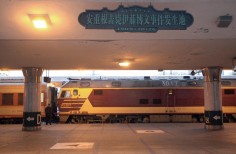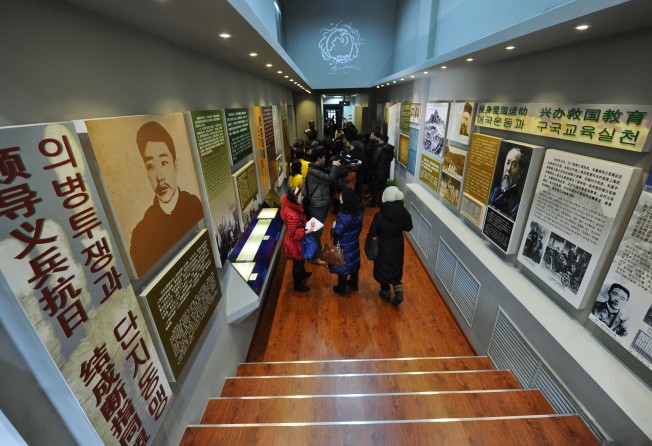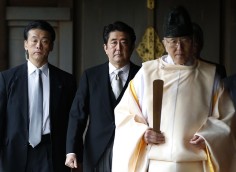
Harbin museum to Korean who shot Japanese PM symbolises divisions
Memorial to assassin, and the reactions it stirs, symptomatic of the continuing hold history has over Japan's ties with China and South Korea

Visitors to the newest museum in Harbin, in northeastern China, enter through a quaint facade affixed to the modern shell of the main train station. No bigger than a 7-Eleven, the museum could easily be mistaken for a restaurant and hardly looks like a place connected to an international incident - or two.
It's on the site where Ahn Jung-geun, a Korean, gunned down Hirobumi Ito, then Japan's prime minister, in 1909, just before Japan formally colonised Korea. Ahn, who was executed by the Japanese, has long been celebrated in Korea as an independence activist. But when the exhibition opened last month, Japan's government lashed out. The chief cabinet secretary called Ahn "a terrorist".

The museum opening came just weeks after Japanese Prime Minister Shinzo Abe visited the Yasukuni Shrine in Tokyo, which commemorates millions of the nation's military dead, including hundreds of second world war figures convicted by allied war tribunals. The move prompted denunciations from China and South Korea, and even American diplomats described it as "disappointing".
Nearly 70 years after the end of the second world war, relations between Japan and China - and to a lesser extent South Korea - remain deeply coloured by wartime wounds. Though the countries have strong economic ties, the urge periodically to pick at historical scabs seems irresistible - and even useful.
Analysts say the tension could stifle dialogue and cooperation on a host of contemporary issues, from disputed islands to the North Korean nuclear issue. Some experts fear that the sniping could inadvertently lead to conflict.
The strain has put the US in an awkward position. America has a military alliance with Japan and South Korea, but it also wants cooperative ties with China.
"In both countries, there's an underlying story about World War Two that creates foreign policy difficulties," says Boston College political science professor Robert Ross. "On the Chinese side, it's a story of massacres and violence and so forth. On the Japanese side, it's a story of 'We really didn't lose that war,'" Ross says. "They lost the war against the United States - they acknowledge that - but in their hearts ... many Japanese don't feel they lost the war against China. And these underlying psychologies contribute to how you deal with foreign policy."

"There's a Chinese expression that says, 'On the first day, the people oppose Japan; on the second day, they oppose Chinese policy towards Japan; and on the third day, they oppose the Chinese government,'" Ross says. "I think [Beijing worries] about that. So to prevent it from getting that extreme, you have to let some out. They're between a rock and a hard place."
This time around, China has launched a fierce international diplomatic and PR campaign. The government has invited foreign journalists on trips to see the Harbin museum and other sites related to Japan's imperialist activities. One stop is the nearby base of Unit 731, where the Japanese military conducted harrowing germ and biological warfare experiments on Chinese.
In recent weeks, both Beijing and Tokyo have been rehashing history in a global war of words, in effect urging other nations to choose sides. Beijing's ambassador to Britain wrote in the Daily Telegraph that "there are always some incorrigible people in Japan who have shown no sign of remorse for war crimes ... These people pose a serious threat to global peace."
Abe, meanwhile, has offered his own historical analysis. At the World Economic Forum in Switzerland last month he said current relations between Beijing and Tokyo parallel the strain between Britain and Germany on the eve of the first world war. He suggested that it was an increasingly rich and aggressive China, not Japan, that was the threat.
"We must restrain military expansion in Asia ... which otherwise could go unchecked," Abe warned without naming China, which has been investing deeply in naval and air defence assets.

Jin Canrong, associate dean of international relations at People's University in Beijing, says that Chinese leaders believe Abe is deliberately stoking tensions to shore up his political base ahead of painful economic reforms. The prime minister may also hope to win Washington's support to change Japan's constitution.
"China has tried to check this by sending out ambassadors to speak out and appeal to the West," Jin says. "China hopes the US will play some role and put some check on Japan's right wing."
That expectation has put the Obama administration in an awkward spot.
"They want to strengthen the alliance with Japan while maintaining a generally co-operative relationship with China," says Taylor Fravel, associate professor of political science at Massachusetts Institute of Technology in the US. "One consequence of … [Abe's shrine] visit is that it worsens ties between two US allies, Japan and South Korea."
Asked repeatedly about the sharp words between Japan, China and South Korea last month, US Deputy Secretary of State William Burns said in Tokyo: "We strongly encourage our allies in Tokyo and Seoul and the increasingly important country of China to find constructive ways to deal with sensitive issues of history."
Fravel says Japan-China relations are likely to remain frozen for the remainder of Abe's term.
China has made "it very personal about Abe himself," Fravel says. "That reflects the judgment that Abe is not a leader with whom China is willing to do business." At the same time, "now that it's personalised, Abe would look even weaker if he made concessions ... So it's kind of a vicious spiral."